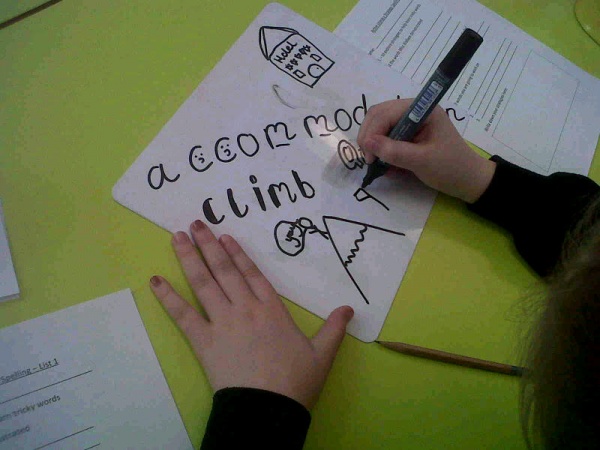How can I support my child with their active literacy homework?
- You could attend an active literacy parent workshop which are held regularly at different primary schools. There are also parent leaflets which contain lots of helpful information and links through to useful websites to support literacy at home. Further information can be found at: https://blogs.glowscotland.org.uk/fa/CurriculumSupport/2013/05/02/using-reciprocal-teaching-to-engage-parents-in-active-literacy/
What is a phoneme?
- A letter or group of letters that make a single sound, for example, ‘oi’ or ‘a’.
What are Elkonin boxes?
- These are used to teach phonemic awareness. Pupils listen out for the individual sounds and mark where they hear them in boxes.
What is diacritical marking?
- Diacritical marking is the use of symbols to mark single sounds/ phonemes (e.g. b, p), joined phonemes (e.g. sh, ch) and split phonemes (magic e words). It is a spelling strategy which is used as part of the ‘Active Literacy’ approach in schools. It is usually taught at Primary 4 and 5, though can be continued and developed in the upper stages. There are three parts to the code: a single dot which represents a single phoneme, a line which represents a joined phoneme and an arch which represents a split phoneme.
What is Reciprocal Teaching?
- This is a strategy used during Active Learning where children will work together to support and challenge each other. They may adopt roles such as ‘word reader’ or ‘word writer’.
Which spelling strategies are taught at school and how I can support my child with this?
- There are many spelling strategies taught in school. Some of the ‘fun’ spelling tasks which are used to learn common or tricky words include: Rainbow writing, fancy writing, spell-er-cise, bubble writing, big and little writing, type-em-up, rhyming words, newspaper letters and triangle spelling. Other strategies taught are: syllabification, mnemonics, words within words, word shape, spelling rules and compound words.


